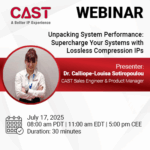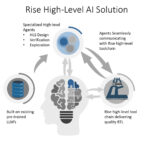An engineering change order, or ECO in the context of ASIC design is a way to modify or patch a design after layout without needing to re-implement the design from its starting point. There are many reasons to use an ECO strategy. Some examples include correcting errors that are found in post-synthesis verification, optimizing … Read More
Tag: webinar
WEBINAR: Functional ECO Solution for Mixed-Signal ASIC Design
This webinar, in partnership with Easy-Logic Technology, is to address the complexities and challenges associated with functional ECO (Engineering Change Order) in ASIC design, with a particular focus on mixed-signal designs.
The webinar begins by highlighting the critical role of mixed-signal chips in modern applications,… Read More
WEBINAR: Edge AI Optimization: How to Design Future-Proof Architectures for Next-Gen Intelligent Devices
Edge AI is rapidly transforming how intelligent solutions are designed, from smart home devices to autonomous vehicles, healthcare gadgets, and industrial IoT. Yet, architects, chip designers, and product managers frequently grapple with a common and daunting challenge: creating efficient, high-performance AI solutions… Read More
WEBINAR Unpacking System Performance: Supercharge Your Systems with Lossless Compression IPs
In today’s data-driven systems—from cloud storage and AI accelerators to automotive logging and edge computing—every byte counts. The exponential growth in data volumes, real-time processing demands, and constrained bandwidth has made efficient, lossless data compression a mission-critical requirement. Software-based… Read More
Essential Debugging Techniques Workshop
Essential Debugging Techniques Workshop
This workshop is for hardware engineers, system architects, and anyone who wants to learn best practices for debugging challenging issues encountered while developing FPGAs, SoCs, PCBs, and embedded systems using the Vivado Design Suite. The features and capabilities of the Vivado
Webinar: Mastering Clock Domain Crossings (CDC) and Synchronization Techniques
Description
Clock domain crossings (CDCs) are a critical aspect of FPGA and embedded system design, and handling them correctly is essential for reliable operation. In this one-hour webinar, we’ll break down CDC fundamentals, explore best practices for managing single-bit and bus CDCs, and demonstrate how to leverage Xilinx… Read More
Upcoming Webinar: Accelerating Semiconductor Design with Generative AI and High-Level Abstraction
We have been hearing so much lately about the power of AI and the potential of technologies like agentic AI to address the productivity gap and complexities of semiconductor designs of today and tomorrow. Currently, however, the semiconductor industry has been slow to adopt generative and agentic AI for RTL design code. There… Read More
WEBINAR: Silicon Area Matters!
When designing IP for system-on-chip (SoC) and application-specific integrated circuit (ASIC) implementations, IP designers strive for perfection. Optimal engineering often yields the smallest die area, thereby reducing both cost and power consumption while maximizing performance.
Similarly, when incorporating embedded… Read More
LIVE WEBINAR Maximizing SoC Energy Efficiency: The Role of Realistic Workloads and Massively Parallel Power Analysis
As the complexity of modern System-on-Chip (SoC) designs continues to rise, achieving energy efficiency measured as performance per watt has become a crucial design goal. With the increasing demand for powerful, multifunctional chips, balancing performance with power consumption has become essential. Realistic workloads… Read More
Webinar: Fast and Accurate High-Sigma Analysis with Worst-Case Points
IC designers are tasked with meeting specifications like robustness in SRAM bit cells where the probability of a violation are lower than 1 part-per-billion (1 ppb). Another example of robustness is a Flip-Flop register that must have a probability of specification violation lower than 1 part-per-million (1 ppm). Using Monte… Read More









